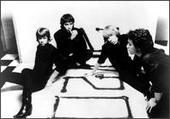Tulsa natives, Flynt and Allen met at age 10 on a baseball diamond, and soon the two friends were putting their guitars and amps on their bicycles, and playing music. Flynt and Allen eventually went to college at OSU in Stillwater, but Allen dropped out and moved to L.A. to pursue a record contract.
By the time Allen scored his own record deal, for a single on Bomp Records, Flynt and a whole bunch of OSU/Tulsans had moved to L.A., so Allen got both Flynt and Phil Seymour to play on what became the "Giving It All" single (which can be found on Rhino’s Shake It Up! -- American Power Pop II CD with 20/20 on the cover). By this time, Mike Gallo had been recruited for the live act, and the band was officially christened 20/20.
The band’s first L.A. gig was at the Whiskey (with gear borrowed from Cheap Trick drummer Bun E. Carlos). 20/20 already had two multi-instrumentalists, but wanted an extra musician on stage, so they auditioned Peter Case, who had just left the Nerves; he opted out after a single rehearsal to form a band where he would be the only singer-songwriter, the Plimsouls. Chris Silagyi was recruited on guitar and keyboards instead. 20/20 soon started getting regular gigs at the Whiskey, Starwood, and Madame Wong’s. In fact, 20/20 was one of the bands that started that whole scene in L.A.
Having cemented their reputation as a formidable live act, 20/20 released their eponymous debut in October 1979, garnering radio play around the country for the songs "Yellow Pills" and "Cheri," along with some isolated regional airplay for "Remember the Lightning" and "Tell Me Why." The synth sounds that were predominant on songs like "Yellow Pills" were something new and fresh to popular music; it was one of the first tunes to get radio airplay with synthesizer sounds.
The success of 20/20 led to an appearance on American Bandstand, which the group watched from an emergency room on the road; they were driving to a gig and remembered that it was almost time for their performance to air, and a hospital was the first place they could think of that would have a TV they could watch. Finding one close by, they raced into the ER and commandeered the TV, attendant patients being quite amazed to see a bunch of long hairs run into the room, watch themselves on TV with Dick Clark, change the channel back, and rush out!
Soon after, the band released a second album, Look Out!, which again received critical acclaim and regional airplay with "Nuclear Boy" and "Strange Side of Love." Unfortunately, disaster struck in the form of the Knack and an albatross hung around their necks that went by the name of power pop. "Power Pop" was a term coined by Pete Townshend in 1967 to describe the music played by the Who, Beach Boys, and the Small Faces. In the late Seventies, the term was resurrected by Bomp magazine, and in a manner similar to the spread of the term "No Depression," applied to the music of bands who ignored progressive rock, stadium rock, disco, and singer-songwriter styles that topped the charts. Badfinger, the Raspberries, the Nazz, and the Dwight Twilley Band all got retroactively termed "power pop." 20/20 was among the first "new" bands to get the label.
When the enormous backlash against the Knack hit, it virtually ended the careers of many far superior L.A. bands, among them 20/20 and the Plimsouls, who were undoubtedly the other two most popular bands of the scene.
"It was easy for writers to label the L.A. scene at the time," explains Flynt, "because there were a lot of bands coming from the same place with similar philosophies: the Knack, Paul Collin’s Beat, the Plimsouls, Gary Valentine & the Know, the Rubinoos. We were all from L.A., playing three-minute pop songs. We weren’t guitar heroes, or playing stadium rock. It wasn’t Journey. It was the antithesis of that. All of us felt the same way, so it was easy for people to clump us all together even though we were all very different. There was a lot of other bands at the same time doing the same thing."
20/20’s label could never translate radio play and sold-out shows into national chart success, so when the label wanted to do a third album, 20/20 declined; they reasoned that if Bomp couldn’t sell Heart, either -- a band that had left the label and then immediately topped the pop charts -- they might have better luck elsewhere. A new deal with a major label fell through, leaving the band without a label and still in debt from the initial advance, so the band released their third album Sex-Trap in 1983 on their own Mainway Records. Spurred by more critical acclaim, the album was picked up by Enigma, but again, the band had signed to a label that would later become successful before the band had any hit records.
by Kent H. Benjamin, The Austin Chronicle
